Wild honey and rye: traditional Polish food for modern cooks


The doorbell rang and I dashed to meet the delivery man. He had a parcel containing a book I had been eager to see from the moment I heard of its first draft. Clutching the padded envelope, I took it to a quiet part of the house where the light flooded in through the window, so I could savour in solitude my first glimpse of Wild Honey and Rye.
Full disclosure as I’ve known Ren Behan, the author of it, since my early days of blogging. We met at one of the early Food Blogger Connects and she was one of the first people I spoke to when I nervously entered a room of food blogging strangers. Since then we’ve met up in some exciting places (at Diana Henry’s home for tea, upstairs in the private kitchen at Jamie’s Fifteen) and some less so (a snatched coffee in Hertfordshire with fidgety toddlers and sulky teens springs to mind) but despite living on different continents we’ve built and sustained a friendship based around our shared passion for writing about food and food issues. I’ve always admired Ren’s focus, clarity of thinking and determination too.
The other common ground was our heritage. Ren’s parents were part of the huge community of Poles who were forced to migrate during the Second World War. As Ren writes in her introduction, Polonia means Poland in Latin, but is also a term given to people of Polish origin who have left their homes and live elsewhere. This diaspora is one of the largest in the world. There are many tales to be told about the reasons for this mass emigration, but the war and subsequent power struggles wreaked much hardship, danger and tragedy. My own Father’s family were part of this exodus too.
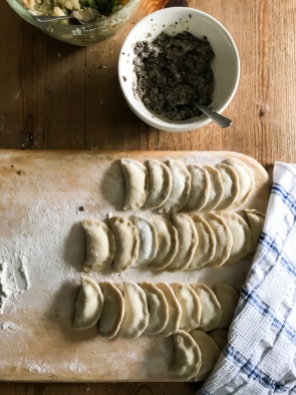

The Polish community in Britain
The Poles were crucial contributors to the success of the Allied war effort, from being the largest group of non-British personnel in the RAF during the Battle of Britain to vital cryptography skills deciphering the early version of the Enigma machine. At the end of the war when Poland came under a communist government and the Kresy region that had been invaded by Russia remained under Stalin, many Poles made permanent new homes, which included over 160,000 who settled in the UK.
In her book, Ren tells of her upbringing, surrounded by a Polish community who were proud of their heritage and as eager to preserve traditions as they were to make a new life for themselves and their families, and of course food was at the heart of this. My own experience was a bit different, due to my Mum being English we didn’t learn Polish or go to Polish Saturday school, but we were still part of gatherings such as the blessing of the eggs at Easter, had traditional Polish costumes made by my Aunt and ate Polish food at the houses of relatives.
Remembering through recipes
Leafing through the book brought back so many memories from the recipes contained within its pages. Here are a few:
- My Mum did all the cooking in our house but about once a year (if that!) my Dad would take over the kitchen and slowly prepare placki – Polish potato pancakes. Of course we made a huge fuss of him and ate every one up as though it was our last dish on the planet, fresh from the pan. My poor Mum, the ingratitude!
- In fact my Mum did learn to make one Polish dish, stuffed cabbage parcels (golabki), filled with minced meat and rice with a tomato sauce, which were utterly delicious.
- My Uncle Janek would shout at us the minute we walked through the door of his house. “Sit down, drink something, have something to eat. Enjoy yourself.” It wasn’t a request, it was an order. At their round dining table we ate Easter (or Russian) salad, my Auntie Eva’s apple cake, tucked into boards of Polish charcuterie with spicy kabanos (common now but only available at a certain shop back then) and drank milky tea. During Autumn they would drive to the Forest of Dean and fill baskets with a variety of funghi, spreading their foraged finds on a small table for us to inspect before frying them in a little butter. I have no clue what we tasted, many were quite strong in flavour with unusual textures, but they must have had some idea about the varieties as I’m still here to tell the tale.


- I hinted at hardships earlier, and when my Father’s family was torn apart suddenly, his eldest sister was left behind and eventually lived almost the whole of her life under communism (and considerable deprivation) in Poland. We met a few times when she was allowed to travel to the UK and later, as the old order changed and travel became easier, I visited her twice. On my last trip with my daughters and my sister, we walked with Ciocia Zyta into her town and bought some wild blueberries that had been freshly picked from the forest. Back in her tiny kitchen she made dough and we fashioned them into pierogi, uniting us where there was the lack of a common language (only my sister speaks Polish). She joked that she could tell our characters by the way we made them, and that I was a perfectionist (guilty as charged).
- After visiting my Aunt we told a white lie and went to stay in an ‘agro-tourism’ place in another part of Poland. We had to fib as she would never have understood why we would pay to stay with strangers rather than with relatives, such is Polish hospitality. Our hostess was a Mrs Bigos (Mrs Stew!) and as there were not many places to eat out in the area we arranged for a sort of high tea every day. Hard boiled eggs from her hens, charcuterie, cheese, fresh lettuce, cucumber, tomatoes and radishes from the garden and good bread with unsalted butter sated our appetites whipped up by lots of walking in the fresh air (including the chapels of Kalwaria Zebrzydowska).
- People of more than 200 different nationalities make Dubai their home and my children’s junior school decided to hold its first International Day celebration. As you can imagine, competition was fierce to make each stall the absolute best and everyone was eager to share a bit of what makes their particular nation special. I teamed up with another Mum to organise the Polish stall and we had great fun doing it. Maria’s barszcz (beetroot soup) went down a storm even in 28 C temperatures!
 Cucumber salad
Cucumber salad Millet porridge with almond milk and blackberry compote
Millet porridge with almond milk and blackberry compote pierogi
pierogi pierogi in the pan
pierogi in the pan
Modern Polish food
All the food from these memories is in the book, illustrated and explained in an informal but thorough way that encourages you to try them for yourself. The images are lovely – simple but very inviting – the travel ones taken by Ren herself when visiting Poland. What really tips the balance for me is that they all have a place within a normal family menu without compromising the original recipe. Most remain true to very traditional ways of preparation and simple ingredients. There is an occasional nod to ways Polish cuisine has changed to incorporate new things, such as avocado, but it sits well and feels relevant and not gimmicky (like too many cook books).


Cooking through the book
A neighbour gave us some knobbly cucumbers from his greenhouse. I’ve been dressing them sparingly (and dairy free for vegan teen) with dill, vinegar, a little sweetener (raw honey) and oil – which is the lighter variation given for mizeria or cucumber, soured cream and dill salad.
Also dairy free and utterly delicious is millet porridge with almond milk (or jaglanka z mlekiem migdałowym). This doesn’t sound too appealing does it, but trust me when I say it tastes lighter than oat porridge which makes it perfect for a warming summer breakfast (or all year round in Dubai). My only tweak of the recipe was to stir raw honey in after cooking it to preserve the precious healthy enzymes. I served it with a fruity topping made in the same way as Ren’s quick blueberry compote (kompot z jagód) but with foraged blackberry and apple, again with the raw honey stirred in afterwards.


I’m making the most of my time with vegan teen before she starts her next term of university and some pierogi-making was perfect Mother/daughter bonding time. I taught her how to knead dough properly and we set up a little pierogi-production line; it was great fun. Instead of an egg, we used aquafaba (reduced chickpea water) and a little oil in the dough, and she came up with a vegan filling of potato, caramelised onions and peas. I used Ren’s mushrooms and cream filling for the rest (pierogi z grzybami i śmietaną). Anything stuffed is a bit time-consuming but, again, the simplicity meant it wasn’t too arduous and we were really happy with the light, moreish dumplings.
Bookmarked for when I’m feeding a crowd, is Ren’s Hunter’s stew recipe (bigos mamy). Part of the crowd of 150 food bloggers she fed one summer, I still remember how good it tasted. While this is one of the heartier dishes, most recipes dispel any notion that Polish food is stodgy, heavy, unhealthy or not suitable for today’s modern lifestyle or dietary requirements. Wild Honey and Rye will have a permanent place on my kitchen counter and not just because my dear friend is the author (although this adds an extra warmth of feeling when I read it).
Thanks to Pavilion Books for sending me a review copy.



Wild Honey and Rye is published by Pavilion Books (a great source for beautiful cookbooks)


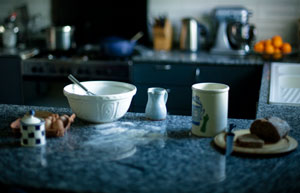







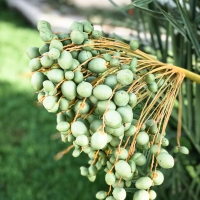
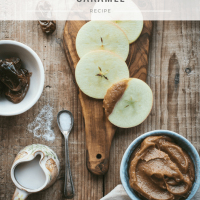
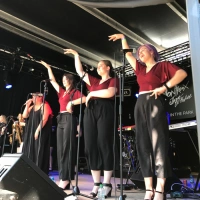
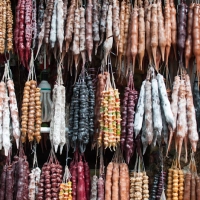

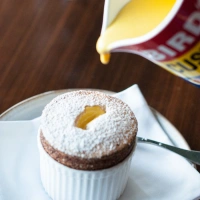
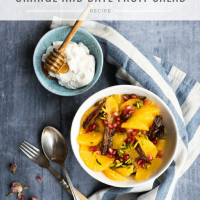




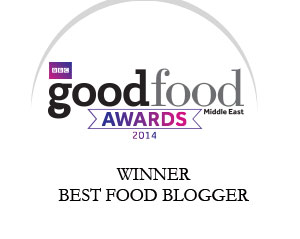



Great post and beautiful pictures!
Great post, Sally! I’ve also enjoyed recently “Polska: New Polish Cooking” by Zuza Zak. Not sure if i ever mentioned that Devon used to have a large community of wartime refugees from Poland who lived in a camp near Newton Abbot. Haven’t been that way for a few years, but we have at least one large Polish supermarket in the county in Exeter, which I keep meaning to visit as the bus stops just outside it. With such a longstanding contribution to to the UK by Polish exiles – yes, thank you, my first London landlord and the woman who got me through my French A level resit! – it’s odd perhaps that the Poles are not more visible. Perhaps it’s the impenetrable language.,. Anyway, ordering this book now on Amazon.
Thanks Dave, much appreciated. I loved Polska too. I’m sure both will appeal and sit comfortably on your shelf. We have just returned from Devon (Axminster) great to know there is a history of Poles in the area.
Dear Sally, thank you so so much for this thoughtful post in which you also share so many of your own Polish food memories. Reading this post, with just hours to go before it launches, has made the whole journey worthwhile. I’m so pleased you enjoyed cooking some of the recipes and that you also created your own flavour of pierogi (even making vegan ones with aquafaba!) which is amazing. I’m craving some of that fruity porridge now, too. I still find it so wonderful that we connected via our food blogs from across the globe, whilst also having some common connections in Manchester via our sisters. A small world, and one which is made all the more interesting by the food that we share with our families and on our blogs. Thank you also for the beautiful photos here and for hosting a giveaway for a copy over on instagram. Smacznego.
What a wonderful review – I loved reading this and I’m sure all of Ren’s recipes and stories are brilliant. She is one of the first bloggers I followed when I started out too and I still love her blog today!
I’m really impressed that Ren has created this book. And, as I have a friend who spent a few years working in Poland quite recently and fell in the love with the country, I think I shall buy her a copy as a pressie – it looks fabulous!
I’m also a Polish expat.. and I need this book! The one I’ve got on Polish cooking is completely out of date, and I’ve got nobody around to ask how to make all these dishes. How is this one with vegetarian options?
Thanks Dee and hello to a Polish expat! Lots of vegetarian options – rye bread, infused honey, cream cheese, eggs, Polish plum butter, millet porridge etc in the breakfast section. A complete chapter on salads, all veggie, such as buckwheat, beetroot and honey salad. Tomato soup, beetroot soup, mushroom soup. Veggie sides, pastry rolls with sauerkraut and mushrooms, flatbreads with courgette, red cabbage and rocket, millet and barley risottos, potato pancakes with mushroom sauce. Cabbage parcels with barley and mushroom sauce. A complete chapter on cakes and bakes, mostly fruity. This is just a few. x
That sounds so wonderful! And so many of those foods bring back great memories.. I’ll definitely be checking this book out – and it’s going to be perfect for Christmas 🙂 Thanks again, and congratulations on publishing it!
I was the same, sooo excited to get the book that I RACED through it when it arrived and we’ve so far cooked one dish, but have a LOT of others bookmarked.
What a lovely post.
What a beautiful post, I really enjoyed reading your memories! I think I adore Ren’s book as much as you do and I hope someday my girls will use it to recreate Polish dishes as well.